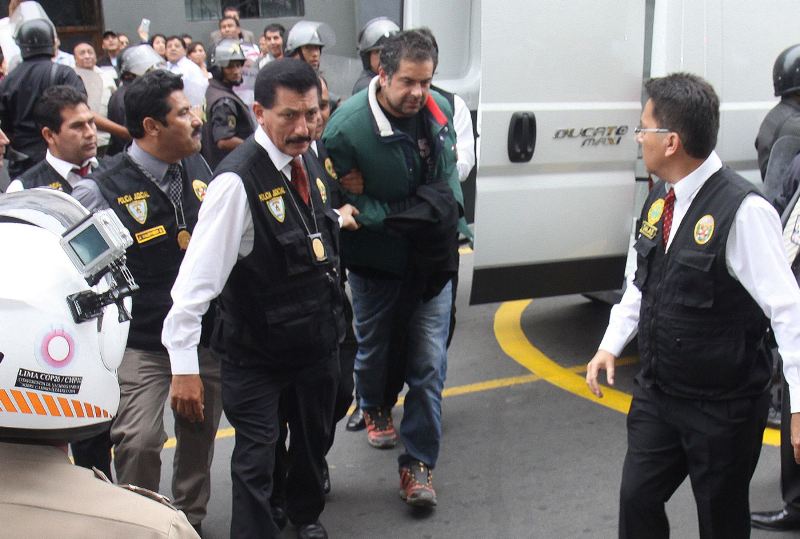Peru’s interior minister has announced tough new regulations for cellular phone accounts as a measure to combat the country’s growing extortion gangs.
According to interior minister Jose Luis Perez, an anonymous cell phone is a “fundamental tool” for criminal gangs. He announced new measures to identify people using phones to extort victims. Starting tomorrow, buying a cell phone SIM card will require photo identification and biometric data such as a picture of the user’s face, iris scan or fingerprints.
“This way we will be able to combat extortion, one of the crimes we are focused on along with contract killings and racketeering, which increasingly threaten the national population,” Perez said.
There are currently 25 million prepay cell phone accounts a population of just over 30 million, and prepaid services account for 80% of all cell phone service in Peru. Perez said that his ministry has begun the task of cross referencing the names and personal info for the prepaid accounts. Starting in June 2016, any accounts with name and identifying data that does not correspond with national records will be partially suspended for 30 days. If their accounts are not updated, a 30-day complete suspension will follow. If the user has not updated their info with the telephone company by the end of both suspensions, the line will be shut off.
In addition to shutting off phone services registered anonymously or to fake names, Perez announced another measure limiting the distinct phone lines a person can have to 10. “The purchases of 100 or 200 cell phones by people who don’t even know that they’re in their name are over.”
Perez added that among the decree powers that government will ask for to address crime is a law to require phone companies to give police a user’s account info within 24 hours of a request.
The announcement comes a day after national newspapers carried headlines of two undetonated grenades which were left in a San Juan de Lurigancho school. A police official told Andina the grenades were a message and that 27 private schools in the district had received similar threats from extortion gangs.
Last month two security guards at a San Juan de Lurigancho school were murdered in a hail of gunfire, receiving a combined 21 gunshot wounds. Two days later a local principal was assassinated. Last week San Juan de Lurigancho district mayor Juan Navarro requested the federal government to send the armed forces to patrol the area’s streets.
Today RPP obtained a letter which a gang circulated among businesses in Callao to extract protection payments. Mayor Felix Moreno requested the marines patrol the more dangerous neighborhoods of Callao. Moreno called unarmed security guards ineffective in his district. “If the security guard goes against a criminal with a gun, the criminal is going to shoot him and kill him.”
On Tuesday, a student at a police academy in Piura was arrested when it was found he had a pending arrest warrant in Ica for extortion.
Last November, police dismantled extortion gangs in Lima, La Libertad and Cajamarca which targeted construction companies and the real estate sector. An industry association survey reported in March that 1.5% of all construction projects’ value went to extortion payments.
Even Peru’s latest high culture features the latest trend in organized crime. Nobel laureate and Peru’s most esteemed novelist Mario Vargas Llosa published The Discreet Hero this year. The story starts with a small business owner who receives an anonymous threat demanding money.
An Ipsos opinion survey in April showed Peruvians believe crime is the country’s gravest problem. 63% cited crime as one of Peru’s three top problems. When asked to cite the country’s gravest threat, 40% chose crime. The second result was corruption with 12%.
Sources
Desde mañana empresas implementan sistema que identifica a clientes de celulares prepago (Andina)
Extorsión se reducirá con identificación biométrica y tope a compra de celulares (Andina)
Cruzarán datos de 25 millones de celulares prepago para identificar plenamente a dueños (Andina)
Arrojan granada en colegio privado de San Juan de Lurigancho (Andina)
San Juan de Lurigancho: declaran en emergencia la seguridad (El Comercio)
Alumno de escuela PNP de Sullana era buscado por la justicia (El Comercio)
Supuestos extorsionadores reparten volantes a comerciantes del Callao (RPP)
Peru Confronts Extortion of Construction Companies (InSight Crime)
Mario Vargas Llosa’s ‘Discreet Hero’ (New York Times)
Voto de confianza (Ipsos)











